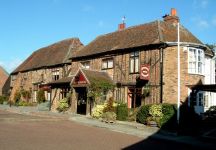Potters Bar is a town in Hertfordshire, England, 13 miles (21 km) north of central London. In 2011, it had a population of 21,882.
Historically in Middlesex, the town dates to the early 13th century but remained a small, mainly agricultural, settlement until the arrival of the Great Northern Railway in 1850. It is now part of the London commuter belt.
History
Potters Bar is located on the Great North Road, one of two road routes from the City of London to the north of England. The road was originally numbered as the A1, and later the A1000.
Potters Bar was historically part of Middlesex and formed the Potters Bar Urban District of that county from 1934. From 1894 to 1934 its area had formed the South Mimms Rural District. In 1965 the district was transferred to Hertfordshire County Council while most of the rest of Middlesex County Council became part of Greater London.
The urban district covered an area of 6,129 acres (24.80 km2). In 1939 it had a population of 13,681, increasing to 24,613 in 1971. In 1974 the urban district was abolished and the area became part of the borough of Hertsmere. Having been part of Middlesex, the area continued to form part of the Metropolitan Police District; with the creation of the Greater London Authority it was transferred to the Hertfordshire Constabulary in 2000.
Byng family
Wrotham Park estate, home of the Byng family, sits within Potters Bar and Barnet on 2,500 acres of land. The Byng family still own a lot of land in the Potters Bar area and The Admiral Byng pub in Darkes Lane is named after Admiral John Byng, who was executed for failing to obey orders in the Minorca campaign.
